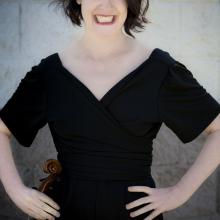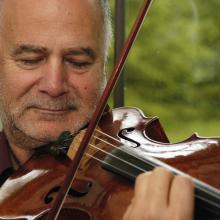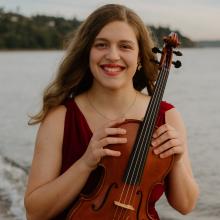Faculty violist Melia Watras welcomes viola legend Atar Arad (her former teacher) and her student Flora Cummings in a concert that celebrates their viola family tree. Arad will perform two chaconnes: his own composition and Bach’s monumental Ciaccona from Partita in D minor, transcribed for viola; Watras will perform three works that she penned for viola solo; and all three violists will take turns performing with each other in selections from Béla Bartók’s 44 Duos.
Program
Ciaconna for viola sola (2021): Atar Arad (b. 1945)
Atar Arad, viola
from 44 Duos for Two Violins, Sz. 98, BB 104: Book I (1931): Béla Bartók (1881-1945)
Menuetto
Magyar nóta (Hungarian Song) No. 1
Szénagyűjtéskor (Hay Song)
Párnás tánc (Pillow Dance)
Atar Arad, viola 1; Melia Watras, viola 2
from 44 Duos for Two Violins, Sz. 98, BB 104: Book II (1931): Béla Bartók
Menetelő nóta (Hungarian March) No. 1
Mese (Fairy Tale)
Mennyasszonybúcsútató (Bride's Farewell)
Magyar nóta (Hungarian Song) No. 2
Flora Cummings, viola 1; Melia Watras, viola 2
Blue Rose for viola solo (2021): Melia Watras (b. 1969)
Sarabanda (The void after the second beat — for Atar) for viola solo (2022)
Lament for viola solo (2016)
Melia Watras, viola
from 44 Duos for Two Violins, Sz. 98, BB 104: Book III (1931): Béla Bartók
"Ugyan édes komámasszony..." (Teasing Song)
Ara táskor (Harvest Song)
Máramarosi tánc (Dance from Máramaros)
Szól a duda (Bagpipes)
Atar Arad, viola 1; Flora Cummings, viola 2
from 44 Duos for Two Violins, Sz. 98, BB 104: Book IV (1931): Béla Bartók
Forgatós (Romanian Whirling Dance)
Oláh tánc (Wallachian Dance)
Pizzicato
“Erdélyi” tánc (Transylvanian Dance)
Atar Arad, viola 1; Melia Watras, viola 2
Ciaccona from Partita in D minor for solo violin, BWV 1004: Johann Sebastian Bach (1685-1750)
Atar Arad, viola
Program Notes
Tonight’s concert, Branches, centers around three generations of a musical family tree, reaching from my beloved teacher, Atar Arad, through me, and to my wonderful current student Flora Cummings (who previously studied with one of my former students, the fantastic Alessandra Barrett Erickson!). Atar’s teacher, Andre Gertler, was a violinist who performed concerts with the legendary Hungarian composer Béla Bartók, and recorded many of Bartók’s violin works, including the duos which are on tonight’s program.
Arad’s Ciaconna and my Sarabanda find their roots in Atar Arad’s project, Partita Party. Inspired by J. S. Bach’s Violin Partita No. 2, Arad conceived a collaborative work by four of his former students and himself. I was honored to be a member of this team! We recently gave its world premiere at Indiana University.
Another interesting connection to note is between Béla Bartók and the University of Washington. In 1941, Bartók was offered a position at UW as the Walker-Ames Lecturer in Music. At the time, his appointment at Columbia University had been up in the air, but was soon extended for an additional year, meaning Bartók would not be available to UW until summer or autumn of 1942. However, the United States’ entry into World War II left UW with some uncertainties financially, so the possible teaching position for Bartók had to be further postponed. Ultimately, the composer’s fading health would prevent him from moving to Seattle, though he was in still in discussion with UW as late as November 1943. Bartók passed away in the fall of 1945.
I’m grateful to Atar Arad, Flora Cummings, the UW School of Music, and the Meany Center for the Performing Arts for making tonight’s concert possible.
—Melia Watras
Atar Arad: Ciaccona for viola solo (2021)
My Ciaccona may not totally qualify as such, and while based on a 12-tone row, it may share very little or nothing at all with a traditional serial writing.
When the Covid pandemic struck us in March of 2020, I happened to be working relentlessly on Bach’s Chaconne, practicing it every day, loving it every day. In fact, loving it obsessively. And as silly as it might sound, as soon as I was asked to write a solo viola piece for the Hindemith International Competition, there was no doubt in my mind that I would name it Ciaccona.
Why I attached the piece to a 12-tone row, inventing my own method for using it, is not clear to me. Perhaps being locked down with no end in sight was an inspiration for trying something new, creating a fresh and personal process for writing my music.
Having fun creating my own version of a Ciaccona and following – and at times breaking – my own rules for doing so, I very often found myself composing with the viola in hands. My ultimate goal was to be inspired by the viola, its character, range of sounds and, also, its technical possibilities. After all, one of my most venerable role models is – and always was – Paul Hindemith.
—Atar Arad
Melia Watras: Blue Rose for viola solo (2021)
Blue Rose was commissioned by violist Rose Wollman for her recording Loop: Ligeti's Inspiration & Legacy. In speaking of her concept, Rose states, “This album presents György Ligeti's monumental Sonata for Viola Solo in historical context. It is deeply influenced by the past as well as inspirational to composers of today. The album pairs each of the six movements of the sonata with a baroque work that highlights the baroque influences in Ligeti's writing. A newly composed work draws inspiration from the baroque-Ligeti pair and completes a set of six triptychs: baroque - Ligeti - commission.”
For my piece, I chose Ligeti’s fifth movement, titled Lament, which Rose had matched with the first movement of Telemann’s Fantasia in A minor, TWV 40:25.
Genetically engineered flowers that do not exist in nature, blue roses have come to represent mystery, fantasy and the unattainable. They have been used symbolically by many authors and creators such as Guillermo del Toro, Tennessee Williams, and by David Lynch in his work Twin Peaks (notable to this composer, a Lynch admirer and admitted Twin Peaks binge-watcher).
Blue Rose is dedicated to Rose Wollman, and can be performed as a stand alone work, in addition to its inclusion in Rose’s Ligeti pairings. (And you don’t have to be named “Rose” to play the piece!)
—Melia Watras
Melia Watras: Sarabanda (The void after the second beat — for Atar) for viola solo (2022)
Atar Arad’s students draw inspiration from him on countless levels. Looking at the myriad of ways his alumni express their creativity is a testament to the artistry he fosters.
I love Atar’s idea of creating a Partita Party! Atar invited some of his former students to join him in each composing a piece inspired by a movement of Bach’s Partita in D minor for solo violin. I am honored to contribute a Sarabande to this project.
For string players, Bach’s solo works are pieces that one returns to again and again. His Sarabandes draw me in with their depth of emotion. The one from the Fifth cello suite, in particular, speaks directly to my heart.
The dedication takes it text from Anner Bylsma’s book Bach, The Fencing Master, in which Bylsma (in discussion of the Sarabande from Bach’s 1st cello suite) writes, “The void after the second beat is wonderful.”
—Melia Watras
Melia Watras: Lament for viola solo (2016)
Lament was written in memory of my father, Joseph Watras, who passed away in 2016 after battling cancer. It is impossible for me to express how much my father meant and continues to mean to me and my music. My dad was a philosophical man, and following his lead, the piece became not only a lament for him, but an expression of a shared sense of mourning that we all feel as part of humanity.
—Melia Watras
Biographies
Atar Arad
Israeli-born violist and composer Atar Arad is a faculty member at the Jacobs School of Music, Indiana University, Bloomington. His summer activities include teaching at Keshet Eilon, Israel, Domaine Forget, Canada, Heifetz Institute and the Steans Music Institute (where he is serving as faculty since 1991).
A Cum Laude First Prize winner at the Geneva International Music Competition (1972), he has performed worldwide in recitals and as a soloist with major orchestras and, for seven years, as a member of the celebrated Cleveland Quartet. His recordings with the quartet and as a soloist for labels such as Teldec, Telarc, RCA and RIAX are widely acclaimed. His performance of Paganini’s Sonata Per La Grand’ Viola e Orchestra in particular is considered by many as a landmark in the history of the viola.
A “late bloomer” composer, Arad’s compositions include a Solo Sonata for Viola, two String Quartets, a Viola Concerto (which he premiered in Bloomington, Brussels and in Stockholm) and more. His Tikvah for Viola Solo was commissioned for the 2008 Munich International Viola Competition by the ARD. His Listen (three poems by W.S. Merwin) for tenor, clarinet, viola, cello and bass was written for the International Musicians Seminar’s concert tour in England with singer Mark Padmore. Epitaph for cello and string orchestra was written for cellist Gary Hoffman who premiered it in Kronberg, Germany, with the Kremerata Baltica Orchestra (Arad performed the viola version of this piece at the International Viola Congress in Rochester, NY). Arad performed and presented his Twelve Caprices for Viola on several USA, Canada, Israel and European concert tours. The Caprices are published by Hofmeister Musikverlag, Leipzig.
Recent performances include the Primrose Memorial Concert at BYU and, as a part of his services as the Lorand Fenyves Distinguished Visitor, in Toronto.
In November 2018, Arad was a featured artist at the International Viola Congress in Rotterdam, premiering his new concerto for viola and strings, titled “Ceci n’est pas un Bach”.
Atar Arad is a recipient of the American Viola Society’s Career Achievement Award (June 2018) and the International Viola Society’s Silver Alto Clef 2018 “in recognition for his outstanding contributions to the to the viola” (November 2018).
In 2021, Arad composed his Chaconne for solo viola, commissioned by the International Hindemith Viola Competition.
Arad plays on a viola by Niccolo Amati. He uses a set of PI strings by Thomastik.
Flora Cummings
Flora Cummings is a Seattle native and a 2nd year music student at the University of Washington, where she studies with Professor Melia Watras and holds the Milton Katims Viola Scholarship. She started violin lessons at age six with Laura Martin, before studying viola with Dr. Alessandra Barrett (a former student of Watras) and violin with Dr. Sarah Pizzichemi. Flora was the runner-up in the North Corner Chamber Orchestra’s 2020 concerto competition, and placed first in the Washington State Solo Viola Competition in 2022. She joined Seattle Collaborative Orchestra in high school and was a soloist with the ensemble her senior year. As well as orchestral music, Flora is an avid chamber music player and loves to play Scottish fiddle music - playing with her family band and performing at the 2018 “More Music@the Moore” showcase for young talent. Flora plays on a 2017 viola by Portland maker David Van Zandt.

Melia Watras has been hailed by Gramophone as “an artist of commanding and poetic personality” and by The Strad as “staggeringly virtuosic.” As a violist/composer/collaborative artist, she has sustained a distinguished career as a creator and facilitator of new music and art.
In the 2025-26 season, highlights include performances of world premieres: works written for Watras by composers Mary Kouyoumdjian and Ha-Yang Kim, as well as her new solo viola piece to be performed by Anthony Devroye in Paris. A new album of her compositions is slated to be recorded for Planet M Records.
Watras’s much-lauded work as a recording artist spans nearly three decades. Her latest album, of her composition The almond tree duos, was recognized by Bandcamp Daily as being among the best contemporary Classical music of the month. Berlin-based music magazine 15 Questions called the duos “pure, poignant, powerful in their immediacy.” The WholeNote notes that her recording Play/Write “unfolds an exquisite world in which beauty and dreams flirt with sorrow.” String Masks, a collection of her own compositions including the titular work which utilizes Harry Partch instruments, was praised for “not only the virtuoso’s sensitive playing, but also her innovative and daring spirit,” by the Journal of the American Viola Society. Textura hailed her compositional debut album, Firefly Songs, for “distilling rich life experiences into strikingly original musical form.” Schumann Resonances was described by the American Record Guide as “a rare balance of emotional strength and technical delicacy,” with The Strad writing of 26 “a beautiful celebration of 21st century viola music.” Ispirare made numerous Best of 2015 lists, including the Chicago Reader’s (“Watras knocked the wind out of me with the dramatically dark beauty of this recording”). A Seattle Times Critics’ Pick for Short Stories, the newspaper marveled at her “velocity that seems beyond the reach of human fingers.” Strings praised her “stunning virtuosic talent” in her debut solo CD, Viola Solo, and declared her second release, Prestidigitation, “astounding and both challenging and addictive to listen to.”
Watras’s compositions have been performed in the US cities of New York, Chicago, Los Angeles, Seattle, Bloomington (IN), and countries including Denmark, Spain, Switzerland, and Wales. She has been commissioned by the American Viola Society, the Avalon String Quartet, violinists Tekla Cunningham, Mark Fewer, Rachel Lee Priday and Michael Jinsoo Lim, violists Anthony Devroye and Rose Wollman, cellist Sæunn Thorsteinsdóttir, pianist Cristina Valdés, accordionist Jeanne Velonis, with works performed by violist Atar Arad, singer Galia Arad, pianist Winston Choi, Harry Partch Instrumentarium Director Charles Corey, violinists Manuel Guillén and Yura Lee, vocalist Carrie Henneman Shaw, percussionist Bonnie Whiting and the ensemble Frequency. Her music has been heard on National Public Radio’s Performance Today and can be found on the albums The almond tree duos; Kinetic; Partita Party; Play/Write; String Masks; 3 Songs for Bellows, Buttons and Keys; Firefly Songs; Schumann Resonances and 26. Watras’s adaptation of John Corigliano’s Fancy on a Bach Air for viola, which she recorded for her Viola Solo album, is published by G. Schirmer, Inc.
For twenty years, Watras concertized worldwide and recorded extensively as violist of the renowned Corigliano Quartet, which she co-founded. The quartet appears on 13 albums, including their recording on the Naxos label, which was honored as one of the Ten Best Classical Recordings of the Year by The New Yorker.
Melia Watras studied with Distinguished Professor Atar Arad at Indiana University, earning Bachelor’s and Master’s degrees and the prestigious Performer’s Certificate. While at Indiana, Watras began her teaching career as Arad’s Associate Instructor, later becoming a member of the faculty as a Visiting Lecturer. She went on to study chamber music at the Juilliard School while serving as a teaching assistant to the Juilliard String Quartet.
Watras is currently Professor of Viola at the University of Washington, where she holds the Ruth Sutton Waters Endowed Professorship. In 2024, the American Viola Society presented Watras with the Maurice W. Riley Award, for her distinguished contributions to the viola as a performer, composer, teacher and leader. She has penned articles for the Journal of the American Viola Society, The Strad (online), Strings and the Juilliard Journal.


